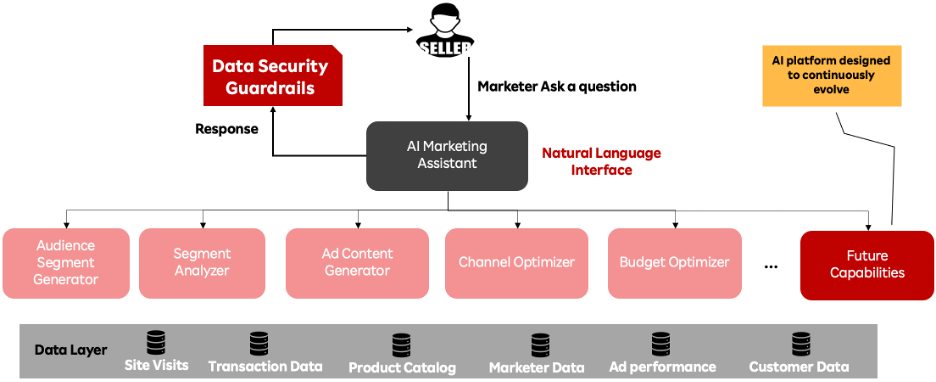Transforming Marketing with Intelligent AI Agents
Generative AI is rapidly reshaping industries, and marketing is no exception. As businesses strive to connect with their audiences in more meaningful and personalized ways, the complexity of modern marketing has grown exponentially. From audience segmentation to crafting compelling ad content, managing budgets, and optimizing campaigns across multiple channels, marketers face a daunting array of tasks. Generative AI offers a solution to these challenges by enabling intelligent systems that can assist marketers in planning, executing, and optimizing campaigns with unprecedented efficiency.
One of the most exciting applications of generative AI in this space is the concept of a Generative AI-based Marketing Assistant. This intelligent system leverages the power of generative AI to simplify and automate the end-to-end marketing process, making it accessible to businesses of all sizes. By combining advanced AI capabilities with a multi-agent architecture, this assistant can handle a wide range of marketing tasks, from creating personalized content to optimizing campaign performance in real time.
How Generative AI is Revolutionizing Marketing
Generative AI is a subset of artificial intelligence that focuses on creating new content, such as text, images, and even videos, based on patterns and data it has learned. In the context of marketing, this capability is being applied to solve some of the most pressing challenges faced by marketers today. Here’s how:
-
Audience Segmentation and Analysis - Understanding your audience is the cornerstone of effective marketing. Generative AI can analyze vast amounts of customer data—such as demographics, purchase history, and online behavior—to identify distinct audience segments. These segments can then be analyzed further to uncover trends, preferences, and opportunities. For example, AI can identify which customer groups are most likely to respond to a specific type of campaign, enabling marketers to focus their efforts where they will have the greatest impact.
-
Content Creation at Scale - One of the most time-consuming aspects of marketing is creating content that resonates with diverse audiences. Generative AI excels in this area by producing high-quality ad copy, email templates, social media posts, and even visual content. What makes this application particularly powerful is its ability to tailor content to specific audience segments while ensuring it aligns with brand guidelines and policies. For instance, AI can generate personalized email subject lines for thousands of recipients, each designed to maximize engagement.
-
Campaign Execution and Optimization - Once a marketing strategy is in place, executing campaigns across multiple channels can be a complex and resource-intensive process. Generative AI can automate this by deploying campaigns on platforms like social media, email, and search engines, while continuously monitoring their performance. It can also make real-time adjustments, such as reallocating budgets to higher-performing channels or tweaking ad content to improve engagement.
-
Budget and Channel Optimization - Marketing budgets are often limited, and deciding how to allocate resources effectively can be challenging. Generative AI can analyze historical data and real-time performance metrics to recommend the optimal distribution of budgets across channels. For example, if a particular social media platform is driving more conversions than others, the AI can suggest shifting more resources to that platform. Similarly, it can identify underperforming channels and recommend adjustments to improve ROI.
-
Personalization and Customer Experience - Personalization has become a key expectation for consumers, and generative AI makes it possible to deliver tailored experiences at scale. By analyzing individual customer data, AI can recommend products, craft personalized messages, and even predict the best time to engage with each customer. This level of personalization not only improves engagement but also fosters stronger relationships between brands and their customers.
The Multi-Agent Architecture Behind the Assistant
The concept of a Generative AI-based Marketing Assistant is built on a multi-agent architecture, where specialized AI agents work together to handle different aspects of the marketing process. Each agent is designed to perform a specific task, such as audience segmentation, content creation, or budget optimization. This collaborative approach ensures that the system operates efficiently and delivers cohesive results.

For example:
-
An Audience Segment Generator identifies and categorizes customer groups based on shared characteristics.
-
A Content Creation Agent generates ad copy, visuals, and other marketing materials tailored to each segment.
-
A Campaign Execution Agent automates the deployment of campaigns across various channels.
-
A Budget Optimization Agent ensures that resources are allocated effectively to maximize ROI.
By combining the strengths of these individual agents, the system can handle the complexities of modern marketing with ease.
The Broader Implications of Generative AI in Marketing
The application of generative AI in marketing goes beyond just improving efficiency—it represents a fundamental shift in how businesses approach customer engagement. Here are some of the broader implications:
-
Democratization of Marketing - Generative AI makes sophisticated marketing tools and strategies accessible to businesses of all sizes. Small businesses can benefit from AI-driven insights and automation that were previously out of reach due to resource constraints.
-
Data-Driven Decision Making - By analyzing vast amounts of data, generative AI enables marketers to make informed decisions based on real-time insights. This reduces guesswork and increases the likelihood of campaign success.
-
Enhanced Creativity - While AI handles repetitive and data-driven tasks, marketers can focus on the creative aspects of their work. Generative AI can even act as a creative partner, providing inspiration and ideas for campaigns.
-
Scalability - Generative AI allows businesses to scale their marketing efforts without a proportional increase in resources. For example, it can generate personalized content for millions of customers in a fraction of the time it would take a human team.
-
Improved Customer Experience - By delivering personalized, timely, and relevant content, generative AI helps businesses build stronger relationships with their customers. This not only drives engagement but also increases customer loyalty and lifetime value.
Generative AI: A New Era for Marketing
The use of generative AI in marketing is still in its early stages, but its potential is already clear. By automating complex tasks, providing actionable insights, and enabling personalization at scale, generative AI is transforming the way businesses connect with their audiences. Whether it’s through intelligent assistants, dynamic content creation, or real-time campaign optimization, the possibilities are endless.
As generative AI continues to evolve, it will undoubtedly unlock new opportunities for innovation in marketing and beyond. For businesses willing to embrace this technology, the future is full of potential.





